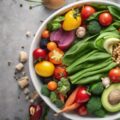With the rise in popularity of vegan and plant-based eating, many people use these terms interchangeably. However, there are some key differences between following a vegan lifestyle and eating a plant-based diet.
What Does It Mean to Be Vegan?
Being vegan encompasses more than just diet. Vegans aim to exclude all forms of animal exploitation and cruelty from their lives.
This means vegans do not consume:
- Meat, poultry or fish
- Eggs or dairy products
- Honey
- Gelatin or other animal-derived ingredients
In addition, vegans tend to avoid products tested on animals as well as leather, wool, fur and other goods derived from animals.
What Is a Plant-Based Diet?
The term “plant-based diet” refers solely to what a person eats. Someone following a plant-based way of eating focuses on foods derived from plants.
A whole foods, plant-based diet consists mainly of fruits, vegetables, whole grains, legumes, nuts and seeds. Those on a plant-based diet do not eat meat, eggs or dairy products.
However, a plant-based diet does not address ethical objections to using animals or animal products for any purpose. People eating a plant-based diet may still use goods containing leather, beeswax or wool.
Similarities Between Vegan and Plant-Based Diets
Vegans and plant-based eaters choose many of the same foods.
Both diets emphasize eating more:
- Vegetables
- Fruits
- Whole grains
- Beans, peas and lentils
- Nuts and seeds
- Plant-based milks like almond, soy or oat milk
In addition, both vegans and plant-based followers exclude animal flesh and animal-derived products like dairy and eggs.
Key Differences Between Veganism and Plant-Based Diets
While their dietary choices may overlap, there are some fundamental differences between vegans and plant-based eaters.
Motivation
Vegans usually cite ethical reasons for their lifestyle and seek to exclude all forms of animal exploitation. Avoiding dietary animal products is just one part of an ethical vegan lifestyle.
Those eating plant-based may do so for health, environmental or personal reasons rather than ethical motivations. Plant-based eaters may have no objections to using animal by-products.
Strictness
Ethical vegans strive to avoid any products containing animal-derived ingredients or that involve animal testing. This includes checking labels of food, clothing and cosmetic products.
People focused solely on a plant-based diet tend to be less strict about trace ingredients and animal testing.
Is One Approach Better?
There’s no evidence that taking a vegan approach versus a plant-based diet alone provides additional health advantages.
However, those excluding all animal products for ethical reasons argue that veganism promotes kind treatment of all living creatures.
In the end, it’s a personal choice based on your reasons for avoiding animal products.
Frequently Asked Questions
Can you be vegan but not follow a plant-based diet?
No, a vegan lifestyle necessitates following a plant-based diet and avoiding all animal products including meat, eggs and dairy.
Are all plant-based eaters also vegan?
No, you can follow a plant-based diet for health or environmental reasons without subscribing to ethical veganism. Plant-based eaters may use some animal products.
Is a vegan diet always healthy?
No, vegans still need a balanced diet with sufficient protein intake. Those eating a lot of processed foods may be nutrient deficient.
Can you be vegan and still wear leather?
No, ethical vegans avoid leather and other animal products in all areas of life, not just in foods.
Do vegans eat honey?
No, ethical vegans avoid honey because its production exploits bees. However, those solely focused on diet may eat honey.









